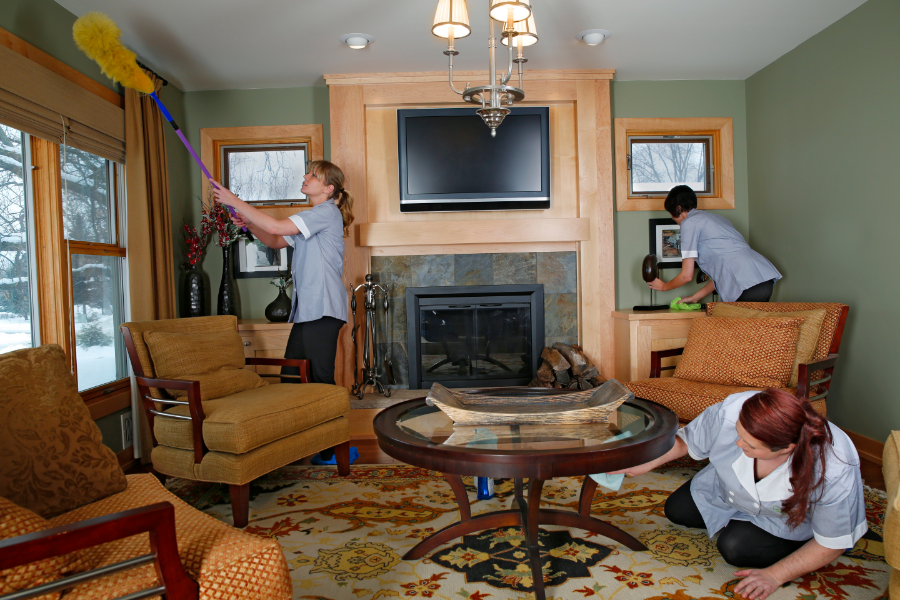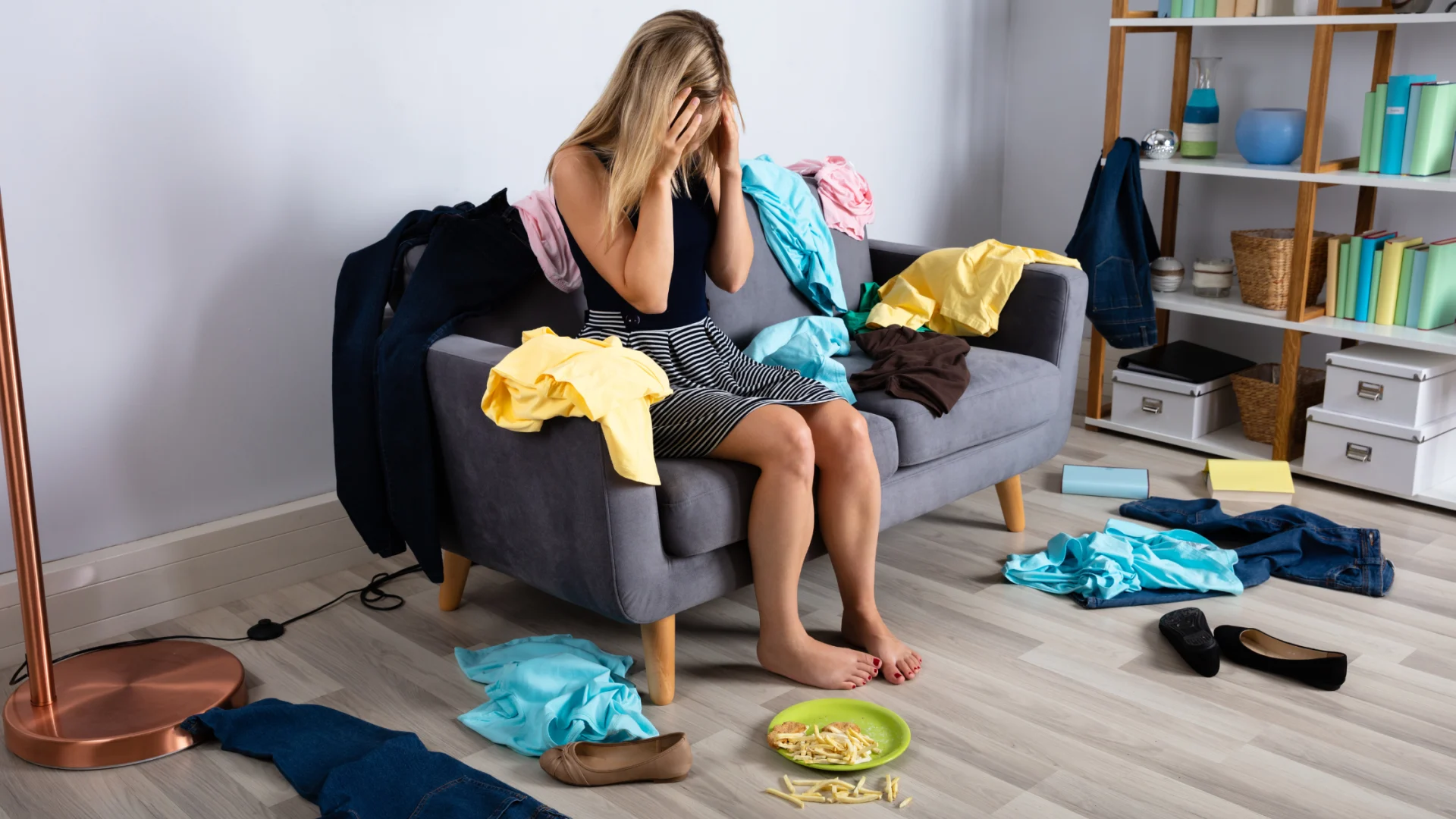Do you know that a clean home is one of the best defenses against sickness, flu, viruses, or COVID-19? A clean house protects you and your family from illnesses and helps your mental health. But what about the opposite? Can a Dirty House Make You Sick?
A dirty house can indeed make you sick. A messy bedroom, kitchen, and bathroom are breeding grounds for disease, allergens, bacteria, and fungi.
For instance, if you leave your dishes uncleaned or don’t vacuum the floors, you’re inviting bacteria, germs, rodents, or even bugs to come into your home and possibly cause health problems.
If you think your dirty house can make you sick, take action immediately!
Start by cleaning the entire house, from top to bottom. This article will tackle the health risks of living in a dirty house and some tips for keeping it clean.
Why Can a Dirty House Make You Sick?
Homes contain a variety of environments, which, left uncleaned, can become filthy and contaminated quickly.
And the more dirt, grime, and dust your home accumulates, your risk of developing allergies, asthma, and other respiratory illnesses increases.
Anyone living in a dirty house is also at risk of developing cancer and lung disease because of environmental carcinogens.
What in Your House Can Make You Sick?
Germs, bacteria, or viruses can multiply in a dirty home. Be mindful of the things that make your home dirty and messy.
Carpeting
A lot of harmful allergies and microorganisms are hiding in the carpet. The warm surface of a rug allows germs to attach to the fibers.
Vacuuming your carpet frequently can help eliminate dust and allergens and protect you and your family from health risks.
Hidden Mold
Mold does not only grow in a dirty home. It can grow in moist areas.
Be on the lookout for moist-prone areas such as heating vents, under kitchen sinks, bathrooms, the basement, and anywhere with high humidity levels.
Smoking/ Burning Food
If you or a family member smoke in your house, you are polluting the air in your home, which can cause asthma and respiratory problems for anyone in the home.
Burning food on your stovetop or oven can also cause air pollution.
Pets
Make sure to clean your pet’s paws after walking them. They can also bring dirt and dust into your house.
Pets are also vulnerable to health issues when they ingest dirt.
Air Ducts
The air ducts in your home are one of the most neglected parts of the house. Over time, ducts fill with pollen, dust, pet hair, and the like.
For this reason, the indoor air flowing through the vents can become contaminated, leading to a dirty house and respiratory problems.
Mattresses, Pillows, and Bed Sheets
A dirty bedroom may cause allergies, asthma, or other respiratory problems.
It can cause the proliferation of dust mites as they feed on your dead skin cells.
Which Part of a Dirty House Can Make You Sick?

The most used areas in your house are the usual breeding grounds for mold, dust mites, viruses, or bacteria.
Make sure to clean these areas to ensure a clean and healthy home.
Kitchen
If kitchen items, appliances, or dishwashers are left unclean, this may lead to mold and bacteria buildup.
Unclean spoons, plates, cutlery, and even your unwashed hands can contaminate raw meat or food.
On the other hand, a dirty oven can be a severe fire hazard.
Hence, keeping the kitchen clean at all times will protect your family from illnesses and other dangers.
Bathroom
Bathroom floors and surfaces are susceptible to parasites or germs that may cause human illnesses.
A dirty bathroom is a home to various kinds of bacteria, such as staphylococcus and E. coli, which cause stomach sickness and cramps.
Take note that germs are not only around the toilet.
Warm moisture from the faucet and shower can make the bathroom prone to mold and mildew, triggering asthma symptoms and allergies.
Bedroom
Nothing beats falling into a clean and comfy bedroom. However, your bedroom is an area that can become prone to bacteria, dust, and pests.
Clean your room, and wash your bedsheets to avoid bacteria-inducing diseases.
Living Room
Families spend a good amount of time in the living room. So it’s important to keep it clutter-free and well-vacuumed.
If you leave the living room dirty, you expose the family to dust, and if you have pets, pet hair and dander.
What are the Health Risks of Living in a Dirty House?
Living in a dirty house can be detrimental to your health. Here are four health risks associated with a moldy shower or a dirty bathroom.
Skin Infections
A dirty home may cause potential skin irritants in bacteria-hidden areas such as a dirty bathroom.
If you have an open sore, it may become infected.
Respiratory Problems
Respiratory problems may occur through excessive smoke and dirt.
Mold, dust mites, and other allergens may increase in a dirty environment, making those with allergies and asthma suffer from breathing difficulties.
In severe cases, exposure to a cluttered environment may develop allergies and cause an asthma attack.
Gastrointestinal Problems
A dirty home can also trigger gastrointestinal issues and upset stomachs. Exposure to mold or dust can cause diarrhea, vomiting, and nausea.
Furthermore, if food is stored improperly or in an unclean environment, it may cause food poisoning. Some symptoms may include stomach cramps, diarrhea, and vomiting.
Can a Dirty House Affect Your Physical Health?
Yes, a dirty house can affect your physical health. It can lead to skin irritation, breathing problems, and allergies.
A cluttered home can cause headaches, fatigue, infection, and general irritation.
A dirty home can also be a factor in developmental delays for children.
A study has proven that poor hygiene at home is a potential stress for children, leading to poor brain development.
Can a Dirty House Affect Your Mental Health?
A dirty house will make you vulnerable to mental health problems.
Numerous studies prove a cluttered home or room can contribute to one’s poor concentration, stress, and anxiety.
When a house is dirty, a person may feel overwhelmed, anxious, and out of control. This may lead to anxiety disorder and depression.
How Do I Get a Clean and Healthy House?

Hiring a cleaning company to keep your home clean is a good idea. But if you’re on a budget, try cleaning your house by following the suggestions below:
Empty Your Trash Can Regularly
If you leave your trash can full of trash, cockroaches, and houseflies will most likely invade your house.
As such, empty the bin and clean it regularly. Replace the lid after cleaning it to avoid pests.
Clean the Kitchen
The kitchen is the highlight of your house. It is also often one of the dirtiest places in the house because it is used regularly for cooking.
Clean the kitchen after using it, especially, the counters, dishes, and stovetop, with a clean damp cloth, mild soap, and water.
Keep the Bathroom Dry
The bathroom needs your daily attention. It needs to be clean not only for good hygiene but a clean bathroom gives a good impression to guests.
Wipe the bathroom shower/ bath, doors, tub, and walls after use. Removing excess water and opening the windows will make it dry and fresh.
Keep the Living Room Tidy
Organizing the things in the living room is the best way to start keeping it tidy.
Throw away old newspapers and magazines and pile your book on a shelf.
Pile the newspapers, books, or magazines on the shelves. Make time to declutter the coffee table daily.
Keep the Bedroom Organized
Keep the bedroom clean to help get a good night’s sleep. Don’t make the bedroom a storeroom.
Only allow things meant to be in the bedroom. Also, don’t allow anyone to eat in the bedroom to prevent messy or unwanted spills.
Change the Air Filters
Dirty air filters often cause dirty air ducts. Change the air filters in your HVAC or furnace when they become dirty, and you can stop the spread of dirt, dust, and allergens throughout your home.
How Often Should I Clean My House?
Clean your house regularly. To keep from getting overwhelmed, do one tip a day if you have to.
Cleaning your house this way will prevent you from becoming overwhelmed with household chores at the end of the week. Wait to do major clean-ups at the end of the week.
Sweep or vacuum the floor, and wipe surfaces and counters with disinfectants or mild soap weekly.
Also, replace your bedding with clean ones at the end of the week (dirty bed sheets, pillowcases, and blankets).
Conclusion
Nothing beats a clean home. It is healthy, relaxing, and, most of all, smells good.
Yes, a dirty home is susceptible to various diseases, while a clean home decreases the risk of getting sick. Therefore, cleaning the house is crucial in keeping yourself healthy.
If you are interested in learning what else a clean house can do for you, check out our post – Does Having a Clean House Make You Feel Better?

